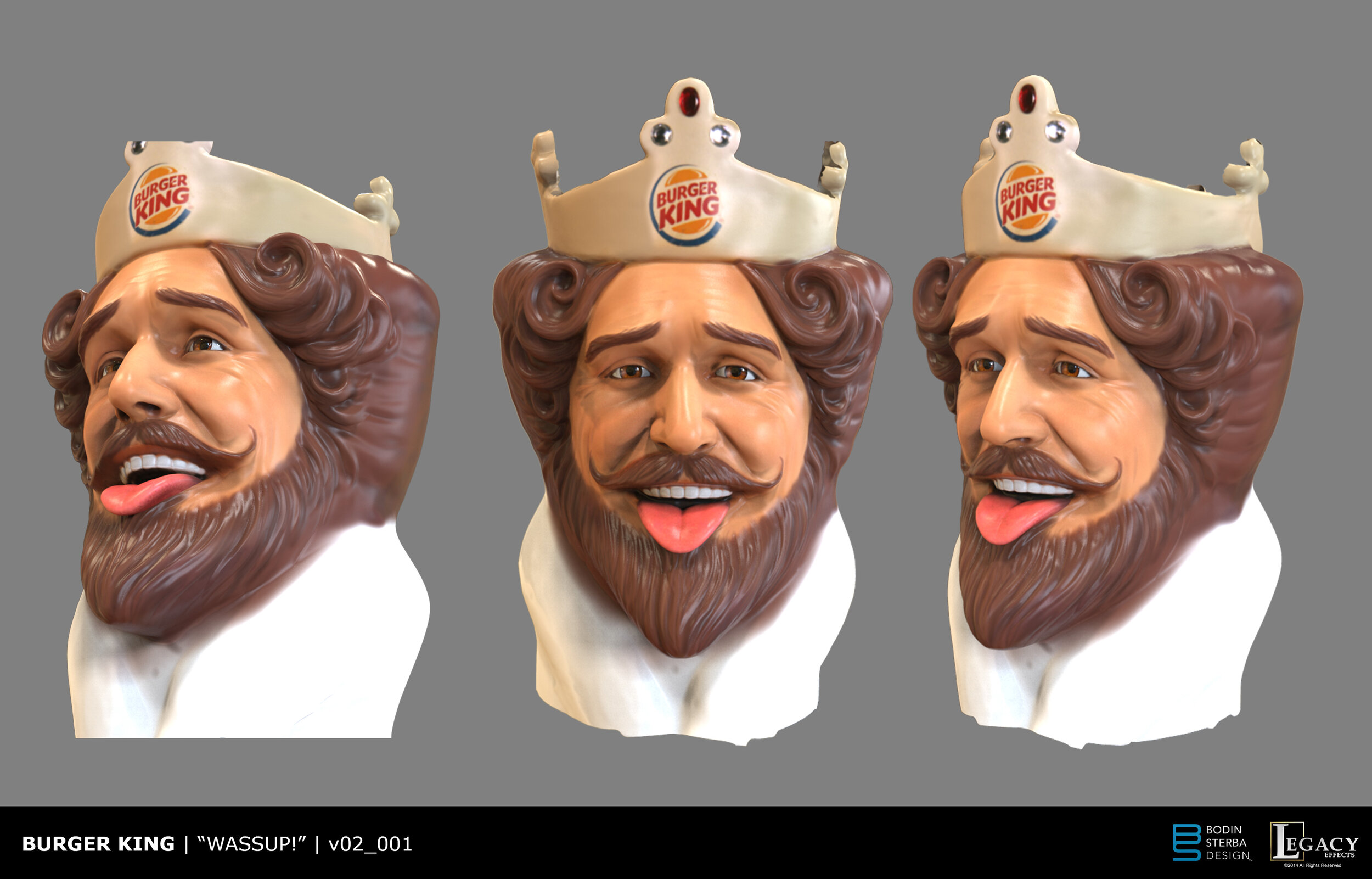There's been quite the stir in the fast-food world recently, and it involves none other than the iconic Burger King crown guy. The phrase "racist Burger King crown guy" has been making waves across social media platforms, sparking heated debates and raising important questions. People are talking, and it's time we dive deep into what exactly happened and why this issue has become such a hot topic. If you're curious about the backstory, stick around because we're about to spill all the tea.
Now, you might be wondering, "What's the big deal about a guy wearing a Burger King crown?" Well, buckle up, because this story is a mix of corporate decisions, cultural sensitivity, and public outrage. It's not just about a costume; it's about the message behind it and how it resonates with different communities. Let's explore how this situation unfolded and why it matters so much.
As we navigate through this controversial territory, we'll be unpacking the layers of this story, from the initial incident to the reactions and consequences that followed. It's essential to understand the context and the broader implications of such events, especially in today's interconnected world. So, let's get started and find out what's really going on with the Burger King crown guy and the accusations of racism.
- The Shrek Squishmallow Phenomenon A Cultural Icon Redefined
- The Rise Of Jameliz Benitez Smith Authenticity In The Age Of Digital Influence
Who Is the Burger King Crown Guy?
Before we dive into the controversy, let's take a moment to introduce the star of this story: the Burger King crown guy. Officially known as "The King," this character has been a staple in Burger King's advertising campaigns for decades. Clad in a royal outfit and sporting a golden crown, The King has become synonymous with the fast-food chain. But who exactly is behind the mask, and what role does this character play in the brand's identity?
Biography of the Burger King Crown Guy
Here's a quick look at the life and career of the person who embodies The King:
| Name | Various actors over the years |
|---|---|
| Role | Official mascot of Burger King |
| First Appearance | 1953 |
| Notable Campaigns | "Have It Your Way," "The King's Back," and more |
Throughout the years, different actors have taken on the role of The King, each bringing their unique flair to the character. From the comedic antics of Paul Soter in the early 2000s to the more recent portrayals by actors like Jason Alexander, The King has evolved with the times, adapting to changing marketing strategies and audience preferences.
- Unveiling The Magnetic Allure Of The Sasori Pfp A Cultural And Digital Phenomenon
- Mastering Jvm Memory Management The Crucial Role Of Xmx And Beyond
Understanding the "Racist" Accusations
Now that we know a bit about the Burger King crown guy, let's address the elephant in the room: the accusations of racism. The phrase "racist Burger King crown guy" has been circulating widely, and it's important to understand the context behind these claims. What exactly happened, and why are people upset?
Breaking Down the Controversy
The controversy began when a particular advertisement featuring The King aired, drawing criticism for its perceived insensitivity towards certain racial groups. Some viewers felt that the ad's imagery and messaging reinforced harmful stereotypes, leading to accusations of racism. Let's break down the key points:
- The ad in question featured The King in a setting that some found culturally inappropriate.
- Viewers interpreted certain elements of the ad as mocking or belittling specific communities.
- Public reaction was swift, with social media users voicing their concerns and calling for accountability.
It's crucial to note that the perception of racism can vary depending on cultural background and personal experiences. What one person might see as harmless, another might view as deeply offensive. This discrepancy highlights the importance of cultural sensitivity in marketing and advertising.
The Role of Cultural Sensitivity in Marketing
Marketing campaigns often walk a fine line between creativity and cultural sensitivity. In the case of the Burger King crown guy, the ad in question failed to strike the right balance, resulting in backlash from the public. But why is cultural sensitivity so important in marketing, and how can companies ensure they don't repeat similar mistakes?
Lessons from the Burger King Controversy
The Burger King crown guy controversy serves as a valuable lesson for brands everywhere. Here are some key takeaways:
- Conduct thorough research and consult diverse voices before launching a campaign.
- Be mindful of cultural nuances and avoid reinforcing stereotypes.
- Respond promptly and transparently to public concerns, acknowledging mistakes when necessary.
By prioritizing cultural sensitivity, companies can build trust with their audiences and avoid damaging their reputations. It's not just about avoiding controversy; it's about fostering inclusivity and respect in all aspects of marketing.
Public Reaction and Social Media Impact
When the "racist Burger King crown guy" controversy hit social media, the response was immediate and intense. Platforms like Twitter, Instagram, and TikTok were flooded with comments, memes, and calls for action. Let's explore how social media amplified the conversation and influenced public perception.
How Social Media Amplifies Controversy
Social media has become a powerful tool for shaping public opinion, and the Burger King crown guy controversy is a prime example of its impact. Here's how social media played a role:
- Users shared screenshots and clips of the ad, drawing attention to its perceived flaws.
- Hashtags like #BoycottBurgerKing and #RacistAdvertising trended, spreading awareness rapidly.
- Influencers and thought leaders weighed in, adding their voices to the discussion.
The speed and reach of social media allowed the controversy to gain traction quickly, putting pressure on Burger King to address the issue. It's a testament to the power of digital platforms in holding corporations accountable.
Burger King's Response and Accountability
When faced with public backlash, how a company responds can make all the difference. In the case of the Burger King crown guy controversy, the fast-food giant issued a statement addressing the concerns raised by its customers. Let's examine their response and evaluate its effectiveness.
Evaluating Burger King's Statement
Burger King's official statement acknowledged the concerns surrounding the ad and expressed regret for any offense caused. The company promised to review its marketing practices and ensure greater cultural sensitivity in future campaigns. While some praised the response as a step in the right direction, others felt it didn't go far enough.
Accountability is crucial in situations like this, and it's important for companies to follow through on their promises. Transparency and action are key to rebuilding trust with consumers.
Impact on Burger King's Brand Image
Controversies like the one surrounding the Burger King crown guy can have lasting effects on a brand's image. How has this incident impacted Burger King, and what steps can the company take to mitigate the damage?
Rebuilding Trust and Reputation
Rebuilding trust after a controversy requires a multi-faceted approach. Here are some strategies Burger King could employ:
- Engage in meaningful conversations with diverse communities to understand their perspectives.
- Implement training programs for marketing teams to enhance cultural awareness.
- Collaborate with cultural advisors to ensure future campaigns are respectful and inclusive.
By taking these steps, Burger King can work towards restoring its reputation and demonstrating a commitment to inclusivity.
Broader Implications for the Fast-Food Industry
The Burger King crown guy controversy isn't just about one ad or one company; it highlights broader issues within the fast-food industry. Let's explore how this incident reflects larger trends and challenges facing the sector.
Challenges and Opportunities in Fast-Food Marketing
The fast-food industry operates in a highly competitive environment, where standing out often requires bold and creative marketing strategies. However, this approach can sometimes lead to missteps, as seen in the Burger King crown guy controversy. To navigate these challenges, companies must:
- Balance innovation with cultural sensitivity in their campaigns.
- Stay attuned to shifting consumer values and expectations.
- Embrace diversity and inclusivity as core components of their brand identity.
By addressing these challenges, the fast-food industry can create marketing strategies that resonate with a wider audience while avoiding controversy.
Conclusion: Moving Forward
As we wrap up our exploration of the "racist Burger King crown guy" controversy, it's clear that this incident has sparked important conversations about cultural sensitivity, accountability, and inclusivity in marketing. While the road to recovery may be long, it presents an opportunity for Burger King and the fast-food industry as a whole to learn and grow.
We encourage you to join the conversation by sharing your thoughts in the comments below. Have you seen the ad in question? What are your thoughts on the controversy? And don't forget to check out our other articles for more insights into the world of marketing and beyond.
Table of Contents
Racist Burger King Crown Guy: The Controversy Unveiled
Who Is the Burger King Crown Guy?
Biography of the Burger King Crown Guy
Understanding the "Racist" Accusations
The Role of Cultural Sensitivity in Marketing
Lessons from the Burger King Controversy
Public Reaction and Social Media Impact
How Social Media Amplifies Controversy
Burger King's Response and Accountability
Evaluating Burger King's Statement
Impact on Burger King's Brand Image
Rebuilding Trust and Reputation
Broader Implications for the Fast-Food Industry
- Kirsten Too Sweet Leaked Incident A Deep Dive Into Privacy And Consent In The Digital Age
- Mastering Secure Connections Solving Ssh Key Issues On Your Raspberry Pi With Remoteiot


